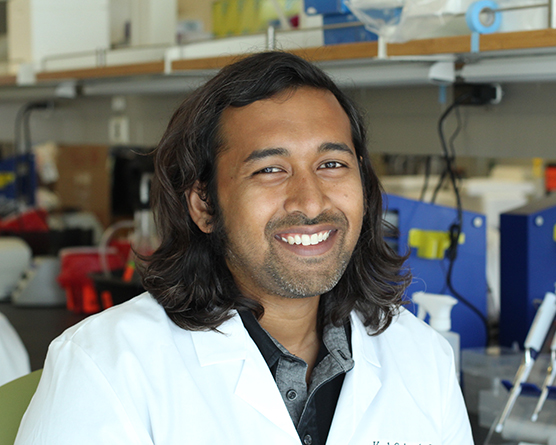
Few researchers have studied how hematopoietic stem cells respond to infection—even though these are the stem cells that give rise to the full battery of specialized immune cells, such as T cells and B cells. Adnan Chowdhury is venturing into this uncharted territory as the winner of the Hearst Fellowship, which will launch his early scientific career with a generous startup package including salary and benefits for a full year.
“None of the immunologists think about the hematopoietic stem cells, and none of the hematopoietic stem cell people think about the immunology,” said Chowdhury. “They’re kind of separated, even though they’re very related, because the hematopoietic stem cells give rise to the immune system.”
Chowdhury has always had a tendency to cross disciplinary boundaries. After growing up in Chicago, he not only pursued a major in cell and structural biology, but also minors in chemistry and computer science as an undergraduate at the University of Illinois Urbana-Champaign. He then obtained a master’s degree in developmental neuroscience, with an emphasis on the retina, from Saint Louis University.
It was Chowdhury’s burgeoning interest in gene therapy that prompted him to learn more about viruses, which can be used as vehicles for delivering new genetic material to cells. As a PhD student at the Saint Louis University School of Medicine, he studied how the HIV virus cannot effectively replicate in patients who are also infected with GB Virus C (hepatitis G virus), a pathogen that causes no deleterious symptoms.
“There’s no negative effect of having a co-infection,” said Chowdhury. “You’re better off in every measure. You have better white cell counts, lower HIV titers, lower transmission rates.”
While pursuing this academically rigorous path, Chowdhury also found time to develop an extensive array of hobbies: glassblowing, scuba diving, running, martial arts, fencing and rugby.
He dedicated his PhD to his grandfather, who was a biology professor and textbook author in Bangladesh.
“He had a master’s,” said Chowdhury. “He was working on his PhD at Rutgers, and he got called back to Bangladesh, so he never got to finish it. Even though I never met him—he passed away before my mom even got married—my mom thinks I’m channeling him, because she says I’m a lot like him. She gets really excited that I’m following in her father’s footsteps.”
As Chowdhury transitioned into his postdoctoral studies, he wanted to learn more about the cells that might receive gene therapy: the hematopoietic stem cells that form the blood and immune systems. These are the stem cells that he currently studies in Rong Lu’s lab at the Eli and Edythe Broad Center for Regenerative Medicine and Stem Cell Research at USC.
For his Hearst Fellowship project, he will examine the response of individual hematopoietic stem cells (HSCs) during acute and chronic viral infections in mice. He will use the Lu Lab’s combination of sophisticated technologies to tag and track individual HSCs, and then evaluate the molecular mechanisms that enable certain HSCs to promote a quick and/or robust immune response. His research could offer clues about how to supplement or stimulate a patient’s HSCs to produce more immune cells faster during a hard-to-beat infection, such as influenza in the elderly or HIV.
“I would like to thank the Hearst Foundations for the opportunity to continue my research,” said Chowdhury, who eventually hopes to run his own laboratory as a principal investigator. “I think this is an idea that no one is looking at, and I really want to blow this field open. It’s very exciting to me.”
